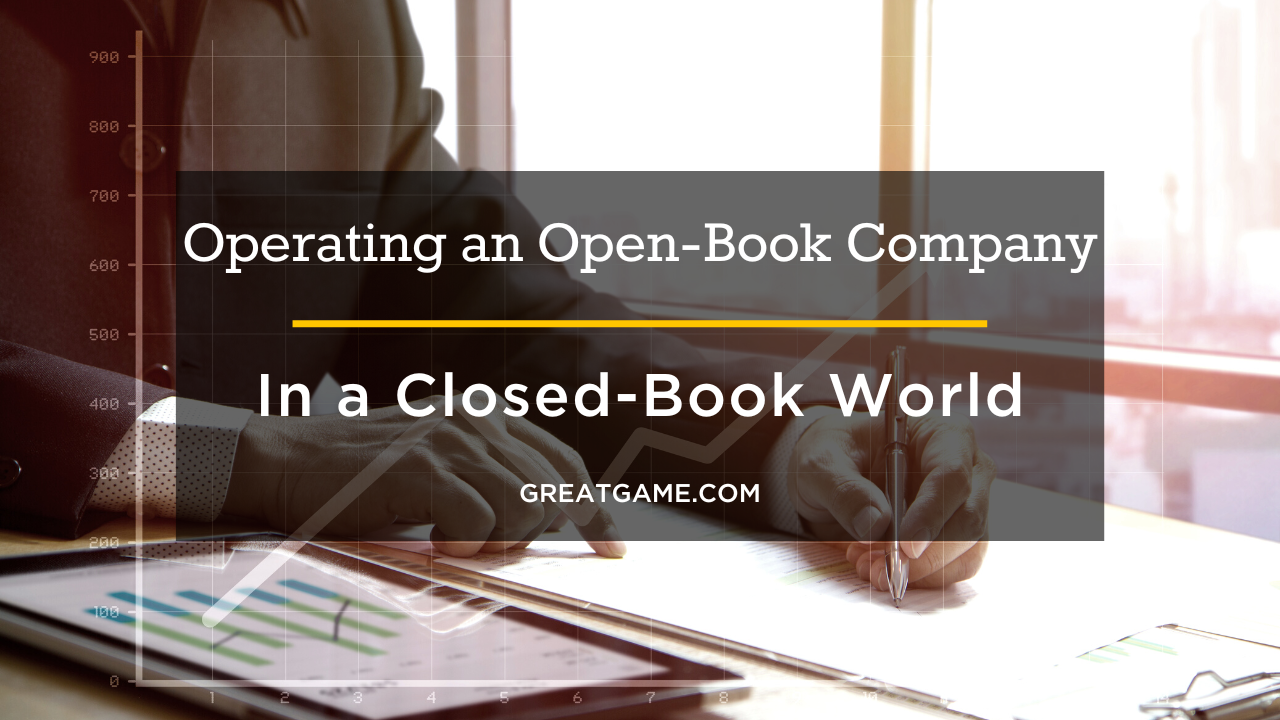
Our company operates in the outsourced contact centre sector. We tend to have relatively few, big corporate clients with large transaction volumes and long term contracts. This means we have quite high levels of single client dependency so we are always trying to make sure we are delivering great services and anticipating our clients requirements so we can satisfy or exceed them. We do a pretty good job generally judging by our client growth and retention rates.
Most of our clients have heard us talk about open-book management but I am not sure they really understand it or appreciate the role it plays in our success and therefore the outcomes we deliver for them as clients. Often times we feel frustrated with our clients because they treat us in a “closed-book management” style. It is not uncommon for large companies to limit the information which is shared with their business partners / suppliers. Information is power and the traditional procurement led approach to supplier management is designed to help the big corporate protect their position of power in the relationship.
As practitioners of open-book management, we know that there is enormous value that can be created when organizations unleash the power and creativity of their employees. We know that an open-book approach is one of the best ways to win the hearts and minds of the employees. So when a major client imposes either deliberately or through omission a blockage to meaningful information flow between their organization and our employees (who are effectively their employees as far as the customer is concerned) we see a shortfall against the value that could be generated. So it got me thinking about how we can help build better Open Book relationships with our clients.
Here are a few ideas we are going to try:
#1 Teach clients the rules of the Game
We teach our employees the rules of the game but we have never really made the effort to teach our clients. Our frustration at their “closed-book approach” is our own fault given we have never taken the opportunity to educate clients on the Great Game and how it impacts on our culture and performance as a business. We need to help them understand the open-book management system and agree how we can use information better to our mutual advantage.
#2 Align critical numbers
In our client relationships there is a very strong level of measurement against KPI’s. The critical numbers are usually fairly evident and we have a good ability to measure these and communicate them across our business at an aggregated and individual performance level. The “closed-book” gap with clients is not with what the critical numbers are, but with how targets are set against these KPI’s. Often times clients will set targets that are overly ambitious in the belief that they can drive performance outcomes with their outsourced providers by dangling the carrot just out of reach. If you do manage to reach the level the bar quickly gets lifted a bit higher. Typically when targets are missed this triggers contract penalties which reduce our remuneration from the contract. This has a flow on effect in that as an open-book company we typically share our client targets with our employees and align their bonuses or “Stake in the Outcome” with the client targets. So if the targets are continually set in a way where they are perceived to be out of reach, the power of the bonus or “Stake in the Outcome” is negated. Again education is required with our clients to demonstrate the linkage between realistic target setting and the Open Book Management system.
#3 Teach clients the value of everyone following the game on a scoreboard
Large corporate companies often outsource parts of their business and keep some in house. They may also outsource to multiple providers. When the large corporate takes this multi vendor and or in-house / out sourced approach, they will be attempting to derive the value of a competitive champion challenger mindset amongst other benefits . This should really play into the hands of an open-book management provider because we know the power that can be harnessed by sharing performance results for various teams on a scoreboard. Unfortunately, the “closed-book” thinking often prevents the client from sharing the competitive data across vendors and or their in-house operations. They will tend to release only snippets of sometimes manipulated data to support their goal of pushing the provider for better performance. This censorship or blacking out of the true scoreboard is potentially incredibly damaging to the performance across the entire estate. We need to teach our clients the benefits of everyone involved being able to “follow the action and keep score”.
#4 Give clients a Stake in the Outcome
Our clients are naturally interested in achieving better financial outcomes. Being tough on suppliers through a procurement led approach is seen as being financially prudent and helping the big corporate drive profitability. If we want to change the “closed-book” behavior, we need to be able to demonstrate what the client’s benefit or “Stake in the Outcome” from an open-book approach will be. We need to model the financial benefits and present compelling business cases as to why they need to adopt a more open book approach. We then need to be able to test it and make it work in the real world so that the client gets a measurable benefit.
.png)







.png)




-5.png)

